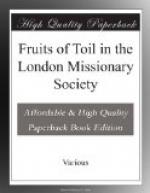“For to
His triumph soon,
He shall descend, who rules
above,
And the pure language of His
love
All tongues of
men shall tune.”
Our earliest mission in Polynesia is constantly offering evidence of the power of the Gospel. The Rev. J. King of Savaii, gives the following striking illustration:—
“Peniamina (Benjamin), was one of the first converts in Samoa, and for thirty years he has maintained an unblemished character. A short time ago I took down from his own lips the story of his life, or I might rather say of his two lives; so great a contrast does the latter half of his life present to the former. The one is the life of the ignorant and corrupt Pagan, the other that of the humble follower and devoted disciple of the Lord Jesus. All who know Peniamina would concur in this testimony that he is one of the brightest gems that has been won for Christ in Samoa. His praise is in all the churches. As a pastor he has done good service. For a number of years he has had the oversight of one of our churches in the out-stations, and so beloved was he by his people, that when, through age, his eyesight failed, and he could no longer read the Scriptures in public, they begged that he would still preach to them, and asked that a young man might be appointed to read the Scriptures for him. This he did for some time, until he became so infirm, that he was compelled to resign. But when he proposed to return to his native village, that he might die amongst his kindred, according to the invariable custom in Samoa, his people begged that he would not leave them; and that, as he had devoted so much of his strength to their good, they might be allowed to ‘nurse’ him in his old age, and to have the honour of burying him in their own village. But the national custom prevailed over their entreaties. A few days after he had taken farewell of his Church, he called on me, and gave me a few steel pens, the remainder of some I had given him for writing his sermons. As he gave them to me, he said, ’I have finished my work: I shall write no more sermons; and that nothing may be wasted that is useful in the work of God, let these pens be given to a younger man, who is still able to write sermons.’ This incident is characteristic of the man, and will illustrate his simple uprightness, and his concern for the work of God. He is now very infirm, but strong in faith; he is calmly waiting to be summoned to his reward.”
Much more might be written on this topic, and these illustrations of Christian experience might easily be multiplied. Our native churches give proof in every direction of the soundness of the teaching from which they have sprung, and of the Divine blessing by which it has been followed. They differ greatly in the outer form of their life from English churches: they differ scarcely less from one another. They differ in their knowledge, in the character of their excellencies, in the form of their defects. They




